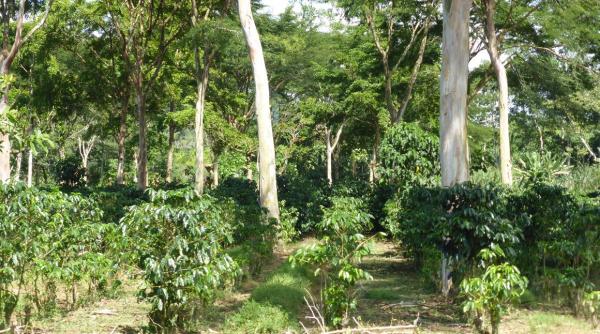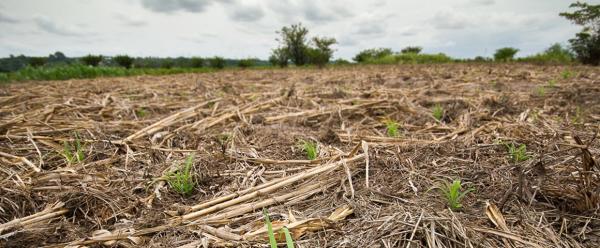Call to action 16 April 2025
- Home
- Press area
- Press releases
- 6th mass extinction: stronger global governance of biodiversity and an economic paradigm shift
The sixth mass extinction calls for stronger global governance of biodiversity and an economic paradigm shift

Indri lemur in Madagascar © G. Vieilledent, CIRAD
"The health of ecosystems on which we and all other species depend is deteriorating more rapidly than ever. We are eroding the very foundations of our economies, livelihoods, food security, health and quality of life worldwide", IPBES Chair Sir Robert Watson said on 6 May at the presentation of the global assessment report on biodiversity and ecosystem services. "It is not too late to make a difference, but only if we start now at every level from local to global. The scale is immense; we have no time to waste", he added.
Economic growth must no longer be an end in itself
Sir Robert Watson called for an economic and financial paradigm shift, by which economic growth would no longer be an end in itself.
In its 2018-2028 strategic vision, CIRAD wrote "Humankind needs to change its relationship with the living world if it is not to destroy it. Development focusing on economic growth, symbolized by growth in GDP alone, would have an exorbitant environmental cost and would not be viable (…) the economic sphere, and particularly its financial component, (must be) seen as a means of supporting the social and environmental fields."
"We must look again at our economic models. We have lost sight of the collective interest and need to look beyond individualism and return to the idea of commons", says Didier Bazile, a CIRAD researcher and member of the French Committee for IPBES who was an observer at the 7th IPBES Plenary. "The resilience of socio-ecosystems poses a social question: that of access to and sharing of the resources that govern the capacity of societies to adapt in order to respond to and resist rapid changes in their environment", he adds. "Rethinking our actions within a new framework centring on commons will at least partly determine the means available to build our future capacity to innovate and react."
Five factors responsible for biodiversity loss and five levers for action
In decreasing order of importance, the factors responsible for the acceleration of biodiversity loss are:
- Changes in land use (agriculture, urbanization, etc) and sea use (fishing, etc)
- Direct exploitation of certain living organisms
- Climate change
- Pollution
- Invasive exotic species.
In the summary of its report produced for policymakers and made public on 6 May, IPBES pinpoints five main types of lever for countering those factors:
- Developing incentives and widespread capacity for environmental responsibility
- Promoting integration across sectors and jurisdictions
- Taking pre-emptive and precautionary actions
- Managing for resilient social and economic systems in the face of uncertainty and complexity
- Strengthening environmental laws and policies and their implementation.
The report lists a number of possible actions to fight biodiversity degradation in terms of agriculture, marine and freshwater ecosystems, and urbanization.
As regards agriculture and the food sector, this means promoting agro-ecological practices, conserving the genetic diversity of cultivated species and their wild relatives, managing landscapes and catchment areas in an integrated way, reforming supply chains, promoting healthy food choices and cutting food waste. The report calls for a commitment on the part of each and every stakeholder in the agricultural and food system. CIRAD has been heavily involved in such actions for many years.
In every case, the report highlights the importance of considering different value systems, interests and world visions when drafting policies and planning actions, notably by involving indigenous peoples and local communities .
Strengthening the interface between biodiversity knowledge and decisions
The next stage will be to translate the findings of the report into policy objectives, to identify the changes required on a local, national and global level. "This global assessment of biodiversity provides the scientific basis for the biodiversity framework and new decadal targets for biodiversity, to be decided in late 2020 in China, under the auspices of the UN Convention on Biological Diversity", Sir Robert Watson said on 6 May. This stage is crucial.
Strengthening the political dimension of IPBES is one of the steps recommended by an external review of the platform, to enable it to fulfil its role as an interface between science and policy. The aim is to influence the decision-making process on every level (from local to global), in every sector (beyond that of the environment), and as regards a wider range of players potentially capable of having an impact on biodiversity (from consumers to policymakers, through business and NGO leaders).
"IPBES currently primarily deals with national policymakers in charge of environmental matters, who are then free to act on a country level as regards local decision-makers, the private sector and citizens" , says Selim Louafi, a political scientist with CIRAD, who was one of the ten experts involved in the review. However, "if we look at biodiversity on a global level, there is a clear need to build capacity for action and coordination between players that goes well beyond national borders and the environmental sector alone".
The review suggested six main fields of action through which to reach local decision-makers, the private sector and conservation project managers:
- Reaffirming the capacity of IPBES to have long-term impact, by means of knowledge, on public policymaking
- Strengthening the political aspects of IPBES' work
- Recognizing the vital role of local and national IPBES operations, ensuring that the knowledge generated is taken into account in the national planning process
- Taking a strategic approach to stakeholders, by clarifying IPBES' partnership strategy and the commitment of key partners such as UN agencies, and multilateral environment agreements
- Involving decision-makers in the production of reports on biodiversity assessments, to facilitate their appropriation
- Stepping up the financial efforts of the IPBES member countries and partners.
IPBES, a major catalyst of scientific knowledge on biodiversity and ecosystem services Since its founding in 2012, IPBES, the equivalent for biodiversity of the IPCC, has produced eight biodiversity and ecosystem services assessment reports, which include the latest, the global assessment of biodiversity and ecosystem services, four on geographical zones, and three on major topics such as pollinators and land degradation and restoration. IPBES has succeeded in being the catalyst for the generation of new knowledge. According to a panel of ten experts tasked with assessing its operations ( summary), IPBES has "already made an important and positive contribution to understanding the root causes of biodiversity loss and ecosystem service degradation and has also had ripple effects in mobilizing academic groups and informal regional environmental and conservation coalitions" . In less than seven years, this intergovernmental platform has succeeded in attracting 132 member countries and establishing a governance structure comprising state representatives, partners and experts, a secretariat, and operating procedures. In short, a major step forward. |
Interdependence, the focus for IPBES' future work
One of the expected deliverables of the 2020-2030 IPBES work programme is an assessment of interlinkages between biodiversity, water, food and health. "The skills of CIRAD researchers could be of direct use in this assessment", says Didier Bazile. "The aim is to study the interlinkages between biodiversity, agricultural productivity, nutrition, pest control, water quality, infectious disease emergence, health, and mitigation of and adaptation to climate change."
Another report is also scheduled on the links between biodiversity and climate change, between now and the 9th IPBES Plenary, facilitated by collaboration between experts from IPBES and the IPCC.
* Four CIRAD researchers contributed to the IPBES report, of which a summary for policymakers was released on 6 May.



























